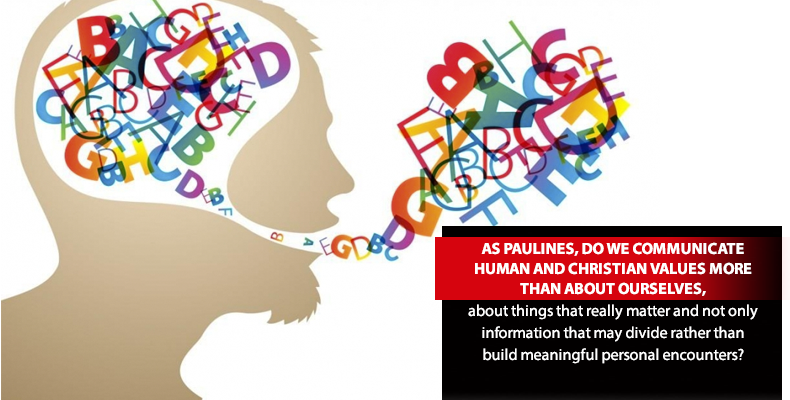What do we communicate in our emails or in FB, Twitter, WhatsApp, Viber, , , , XING, or in our personal blogs? What are the contents: phrases, half-sentences, photos and videos, emoticons or emojis, GIFs, especially selfies? “Canned” messages could be very convenient to use, but they could also betray the quality of our interest to really “encounter” the other person. We know that phrases, half-sentences, emojis and GIFs are not always the ones that last and remain in the receiver’s profound self.
Why do we communicate? Who are our receivers? Of what we send, what is the percentage of what we tell others about themselves and about ourselves? How is our way of communicating, especially during times when we ourselves are caught up in so many problems and preoccupations? From the responses of the receivers, do they perceive our negative state of mind, or they find us supportive, patient, gentle, compassionate, despite our personal problems? What is the impact of what we communicate to others? Do they feel happy, good, inspired, encouraged, hopeful, assured? We know, also, that the less we “talk” about ourselves, the better, especially if the other is expecting our compassion.
As Paulines, do we communicate human and Christian values more than about ourselves, about things that really matter and not only information that may divide rather than build meaningful personal encounters? Remember, what is written is “forever” written. It can make or unmake a good relationship or it can enrich or impoverish the other.
As members of our community, more than communicating with the mediated means, we are asked to be communicators in first person to our brothers and sisters. Our personal communication is meant to build bridges not walls, to create synergy and collaboration, fraternity and communion in view of the mission. Advances in the networks and communication means, especially social media, do not guarantee our being good communicators. It happens only when we find and share in common ‒ as Pope Francis writes ‒ «a “mystique” of living together, of mingling and encounter, of embracing and supporting one another, of stepping into this flood tide which, while chaotic, can become a genuine experience of fraternity, a caravan of solidarity, a sacred pilgrimage»(EG 87). But this comes with a great price for everyone because it requires getting out of our self-centeredness since ‒ the Pope concludes ‒ «to be self-enclosed is to taste the bitter poison of immanence, and humanity will be worse for every selfish choice we make» (EG 87).
We are convinced that a life of personal witnessing to Gospel values is still the best way of communication. But first, let us learn to listen with our mind, that is, with intelligence, with the tenderness of the heart and with the humility of the will to welcome the other as another self. First and foremost, Blessed Alberione exhorts us that the first person to listen to is no other than the Master Himself, especially “at his feet” before the Tabernacle, especially during the Visit. May our Father Saint Paul continue to inspire us with his words: «whatever is true, whatever is honorable, whatever is just, whatever is pure, whatever is lovely, whatever is gracious, if there is any excellence and if there is anything worthy of praise, think about these things» (Phil 4:8). Cor Pauli, cor Christi!



